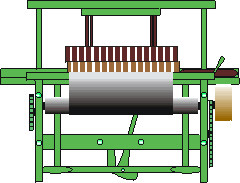|
Next: Lowell's Canal System

The shop underlay Lowell's textile industries: fabricating machines that turned cotton into cloth, building waterwheels, turbines, and steam engines that provided the power, and making shafts, gears, and pulleys that transferred power within the mill. Its influence extended beyond Lowell, as it built machine tools and complete sets of machinery for mills in other cities. The locomotives also produced there helped transform New England's transportation system. Some of the city's best minds headed the machine shop in its early years. Paul Moody, the mechanic who had helped Francis Cabot Lowell develop the power loom at Waltham, was head of Waltham's machine shop. Under Moody, the machine shop was creative and versatile. There the machines for the first mill building in Lowell were built. When the Waltham machinery was moved to Lowell, Moody followed, becoming head of the machine shop upon its establishment there in 1824. George Washington Whistler directed the building of the shop's first locomotive in 1835. He took apart an English locomotive imported from the Stephenson works at Newcastle to learn how it was constructed. From the components, Whistler fabricated patterns from which the shop manufactured its own locomotive - one of New England's earliest. Three years later the shop had turned out 32 locomotives. James B. Francis, who took charge of the machine shop in 1837, was the major figure in Lowell's engineering history. He fine-tuned the city's canal system, engineered the Northern Canal, and oversaw Lowell's transition to turbines. Under Francis’ direction, the Lowell Machine Shop became a leader in the fabrication of hydraulic turbines. The development of such skills in the textile industry's early machine shops was a crucial step in the American Industrial Revolution. Previously, Americans relied heavily on English expertise and machines. It took fine tools to make tools, precise machines to make other machines. The process was slow, and required patient trial and error and borrowed technology before Americans learned to make their own. Much of this learning took place in the Waltham and Lowell shops, where Paul Moody helped train the first generation of master mechanics. Out of these and others’ efforts to emulate British textile technologycame the machine tool industry on which other industries were founded. It was the beginning of America's machine age. Source: Lowell National Historical Park Handbook 140
Next: Lowell's Canal System
|
Last updated: February 26, 2015
